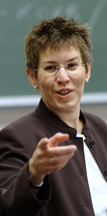At Wabash, we have a recruiting slogan that says, "It won’t be easy… it will be worth it."
That same slogan applies to tenure-track professors early in their careers. Earning tenure at Wabash is not easy — it’s a six-year, comprehensive audition for a teaching position — but we certainly hope the process is "worth it."
At Wabash, tenure-track professors go through a fairly rigorous review during their second year at the College. That’s a time when pedagogical questions are asked and answered and when teaching styles are beginning to take shape.
During the fourth year, Wabash teachers undergo a thorough review by department and division chairs, students, and the academic dean. This is the year when a professor’s personal scholarship is scrutinized, as well.
 Then, in the sixth year, tenure candidates submit an impressive portfolio that encompasses course syllabi, course assessments, personal scholarship, letters of recommendation, committee work, and just about anything else you can imagine. In short, the portfolio represents the myriad accomplishments of a professor’s time at Wabash. Interviews with colleagues and students are conducted, and in early December the president and academic dean make the determination.
Then, in the sixth year, tenure candidates submit an impressive portfolio that encompasses course syllabi, course assessments, personal scholarship, letters of recommendation, committee work, and just about anything else you can imagine. In short, the portfolio represents the myriad accomplishments of a professor’s time at Wabash. Interviews with colleagues and students are conducted, and in early December the president and academic dean make the determination.
If granted tenure, a professor is promoted from assistant to associate professor, which is usually followed by a sabbatical leave that allows for more aggressive work on scholarship or the development of courses.
This year all four professors up for tenure at Wabash were granted promotions to associate professors: Jennifer Abbott in rhetoric (left), Michelle Rhoades in history, William Turner in mathematics and computer science, and Rick Warner in history.
All four are wonderful and even prolific scholars. Better still, all are wildly popular with the students at Wabash. And at a place that values good teaching above all else, the student connection is the most important relationship that develops.
Jennifer Abbott came to Wabash after earning her Ph.D. at Penn State University and her undergraduate degree from Cal Poly. I’ve had the good fortune to sit in on one of her courses and found her remarkably skilled at developing a very focused, seminar-style conversation among the students.
 Furthermore, she works with Wabash students to examine important issues through different lenses. I was allowed to listen to marketing presentations given by her students, whose assignment was to think critically about gender — specifically overt masculinity — in the materials we use to market the college. The view through that lens was different, yes, but it was also relevant and creative.
Furthermore, she works with Wabash students to examine important issues through different lenses. I was allowed to listen to marketing presentations given by her students, whose assignment was to think critically about gender — specifically overt masculinity — in the materials we use to market the college. The view through that lens was different, yes, but it was also relevant and creative.
Michelle Rhoades (right) earned her bachelor’s degree in French from Arizona and earned her Ph.D. in history from the University of Iowa. She’s currently doing original research in gender and cultural history, specifically related to French prostitutes during World War I.
In the classroom, she is known as a no-nonsense history professor who constantly challenges students to hone their critical thinking skills. She seems less interested in having her students memorize dates and places and more interested in their critical analysis of history and the historians who chronicled it. Professor Rhoades asks her students to deconstruct history — to go to primary source documents — to learn at a much deeper level.
Rick Warner took a non-traditional path to the Wabash classroom. He came to Wabash in 1999 to teach Latin American history, but he’d spent time in a number of non-teaching jobs, including as a professional chef, and he later earned his Ph.D. from UC-Santa Cruz.
Professor Warner is the poster professor for student-faculty engagement. He probably spends twice as much time with students out of class as he does in class. It’s a safe bet that if there’s a football game, play, or concert involving students, Professor Warner will be there. And when he’s not working with Wabash students, he’s on the road with the Admissions Office recruiting future Wabash men.
 Will Turner (left) received his bachelor’s and master’s degrees from Iowa State University and his Ph.D. from North Carolina State. I honestly wish I could describe his mathematical research interest in terms we all could understand, but I can’t. I do know he specializes in Black Box Linear Algebra, which is really abstract stuff.
Will Turner (left) received his bachelor’s and master’s degrees from Iowa State University and his Ph.D. from North Carolina State. I honestly wish I could describe his mathematical research interest in terms we all could understand, but I can’t. I do know he specializes in Black Box Linear Algebra, which is really abstract stuff.
What makes him special is his keen interest in his students and pushing them to max out their potential. He’s also a driving force behind Wabash’s Summer Institute in Algebra, which brings to campus some of the nation’s top undergraduate mathematics students for an eight-week program.
Professors Abbott, Rhoades, Turner, and Warner all traveled different paths to get to Crawfordsville and all are unique in the way they interact and motivate their students. What they share in common is a passion for their subjects and a burning desire to work tirelessly with their students.